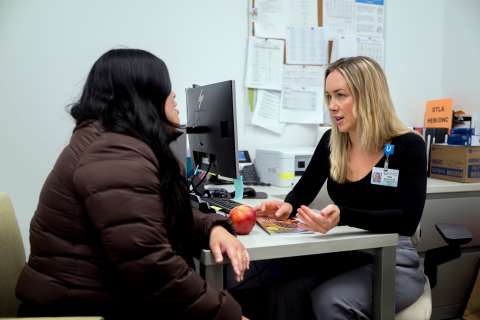The holidays can be challenging – busy schedules, family dynamics, travel, the pressure to be festive, and all that food.
For people with cancer, those challenges are often compounded, says psychologist Valentina Ogaryan, PhD, clinical director of the Simms/Mann UCLA Center for Integrative Oncology, which provides free psychosocial support for people and families navigating a cancer diagnosis at UCLA Health.
“The holidays can bring contrasting emotions that are complex in nature, so it’s important to recognize that it’s OK if you feel hopeful and worried at the same time, or happy and sad or grateful and stressed,” Dr. Ogaryan says. “Cancer and the holidays typically make these types of emotions even more potent. I always like to remind patients and their loved ones that all their emotions are real and all of them are valid, no matter how contrasting they may be.”
It's not just people currently undergoing cancer treatment who may struggle during the holiday season. Cancer survivors can also have a hard time, Dr. Ogaryan says. There may be complex feelings of uncertainty, fear about the future and adjusting to a new norm, even after treatment, she says. Family members and loved ones may also be experiencing grief and worry alongside hope and cheer.
Regardless of where one is on the spectrum of cancer experience – facing a new diagnosis, in treatment, in survivorship, or caring for someone with the disease – communication, flexibility and understanding are key to getting through the holidays, Dr. Ogaryan says.
Here are tips for handling various holiday elements with grace:
Appearance
People undergoing cancer treatment may feel anxious or uncomfortable about their changing appearance, as they may have lost weight, lost their hair, or otherwise look different. These changes can be nerve-racking as individuals may not want to discuss their new appearance.
“I would recommend that patients remember they can adjust their expectations of themselves,” Dr. Ogaryan says, “and they can choose how much they want to talk about (their appearance) with the people in their lives.”
Family members may want to let their loved one with cancer take the lead here, and leave looks undiscussed unless the individual brings it up.
Food
Food is at the center of many holiday traditions, from Thanksgiving to New Year’s Eve. But people navigating a cancer diagnosis may feel differently about food than they did before diagnosis and treatment, says Dr. Ogaryan. Cancer treatment can diminish appetite and cause nausea, and this change in relationship to favorite holiday meals can dampen mood.
“It can even increase feelings of anxiety,” Dr. Ogaryan says. “Because oftentimes people want to still feel connected to others during the holiday and do things as part of tradition, but they worry about how they might feel around the food, or how their nausea and other physical side effects can limit them.”
Family members and celebration hosts can make things easier on a loved one with cancer by asking how to best accommodate their needs. This might include eating at a different time than usual or serving some alternate dishes. It’s important for family members and people dealing with a cancer diagnosis to allow themselves room to consider that this year’s celebration might look a little different, Dr. Ogaryan says.
Traditions
Holidays are all about traditions. But when a loved one is experiencing cancer, flexibility is key to inclusivity in the celebration, and traditions may need to evolve.
“There are certain things about holidays that you can continue to love, that cancer does not have to change, and then there are certain things that cancer will change,” Dr. Ogaryan says. “So find the activities or foster those connections that still feel in line with your values and interests, and then maybe change up the ones that don't.”
Talk with loved ones about what makes sense this year, what traditions are most important and where there may be room for something new. This type of open communication can make everyone feel more supported, Dr. Ogaryan says.
And finally, she advises making time for solitude, no matter who you are. The holiday season can be demanding, and everyone needs room to recharge.





